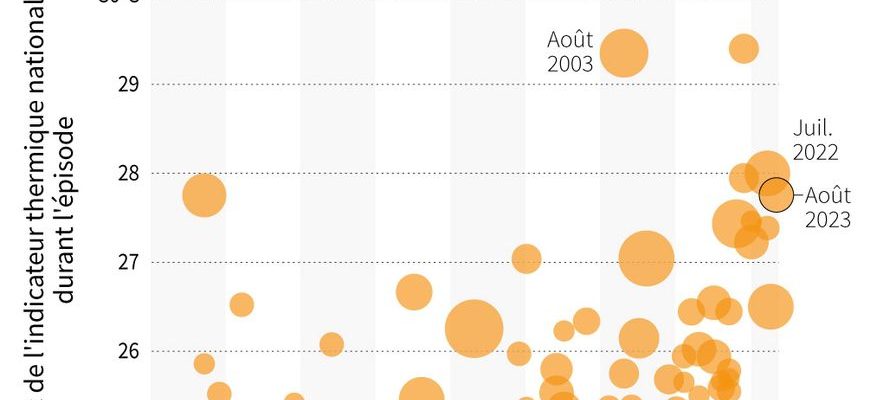2023 will probably be the hottest year in history. This is the observation made, this Wednesday, September 6 by the European observatory Copernicus for which the summer (June-July-August) experienced the highest average global temperatures ever measured.
Heat waves, droughts, floods or fires hit Asia, Europe and North America during this period, in dramatic and often unprecedented proportions, with their cost in human lives and in damage to economies and the environment. .
A global average temperature of 16.77°C
The southern hemisphere, where many heat records were broken in the middle of the austral winter, was not spared. “The June-July-August 2023 season”, which corresponds to summer in the Northern Hemisphere, where the vast majority of the world’s population lives, “was by far the hottest on record in the world, with a temperature global average of 16.77°C,” Copernicus said.
This is 0.66°C above the averages for the period 1991-2020, already marked by rising average temperatures around the globe due to global warming caused by human activity. And well above – about 2 tenths – the previous record of 2019.
July had been the hottest month ever measured, August 2023 is now the 2nd, specifies Copernicus. And over the first eight months of the year, the average temperature of the globe is “only 0.01°C behind 2016, the hottest year ever measured”.
Heat waves in France
© / afp.com/Sylvie HUSSON
El Niño, synonymous with additional warming
But this record is hanging by a thread, given the seasonal forecasts and the return to power in the Pacific of the El Niño climatic phenomenon, synonymous with additional warming.
And “given the excess heat on the surface of the oceans, it is likely that 2023 will be the hottest year […] known to mankind,” Samantha Burgess, deputy head of the climate change service (C3S) at Copernicus, told AFP.
The Copernicus database dates back to 1940, but can be compared to the climates of past millennia, established using tree rings or ice cores and synthesized in the latest report from the UN’s climate expert group ( IPCC).
On this basis, “the three months we have just experienced are the hottest for about 120,000 years, that is to say since the beginning of human history,” says Samantha Burgess.
The overheating of the world’s seas
Despite three successive years of La Niña, the opposite phenomenon of El Niño which partly masked the warming, the years 2015-2022 have already been the warmest ever measured.
The overheating of the world’s seas, which continue to absorb 90% of the excess heat caused by human activity since the industrial era, plays a major role in the phenomenon. Since April, their average surface temperature has been changing to unprecedented levels of heat.
“From July 31 to August 31”, it even “exceeded the previous record of March 2016 every day”, notes Copernicus, reaching the unprecedented symbolic bar of 21°C, very clearly above all the archives.
“Warming the oceans leads to warming of the atmosphere and an increase in humidity, which causes more intense precipitation and an increase in the energy available to tropical cyclones”, underlines Samantha Burgess.
Overheating also affects biodiversity: “there are fewer nutrients in the ocean (..) and less oxygen” which threatens the survival of fauna and flora, adds the scientist, who also cites the bleaching of corals, harmful algal blooms or “the potential collapse of reproductive cycles”. “Temperatures will continue to rise until we turn off the emissions tap”, mainly from the combustion of coal, oil and gas, reminds Samantha Burgess three months before COP28 in Dubai.
This United Nations Climate Conference, where a fierce battle on the end of fossil fuels is shaping up, is supposed to put humanity back on the trajectory of the Paris agreement: to limit global warming to well below 2°C. and if possible at 1.5°C compared to the pre-industrial era.
“The climate collapse has begun”
“The climate collapse has begun,” UN Secretary General António Guterres said in a statement on Wednesday in reaction to the announcement of the world record temperature during the northern hemisphere summer.
“Scientists have long warned of the consequences of our reliance on fossil fuels,” he added. “Our climate is imploding faster than we can handle it, with extreme weather events hitting every corner of the planet.”
